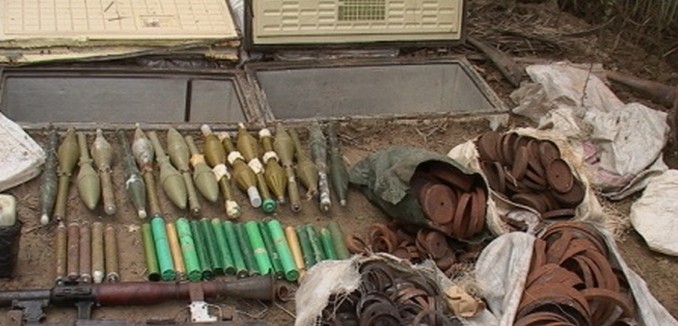Iran’s increasing efforts to ship explosively formed penetrators (EFPs) to Shiite militants in Bahrain and Saudi Arabia pose a strategic threat to those American allies in the Gulf, Michael Knights argued in a paper published on Wednesday by the Washington Institute for Near East Policy, where he is a fellow.
Iran’s Islamic Revolutionary Guard Corps began sending EFPs, which can penetrate armor, to militants in Saudi Arabia’s predominantly Shiite eastern province last year, and has been teaching cells in Bahrain how to manufacture the explosives. The aid to these groups was described by Knights as Iran “ramping up its risk-taking behavior amid growing sectarian polarization in the region and intensified competition with Riyadh.”
He added that this escalation poses an implicit threat to Saudi Arabia, which may be targeted by Iran-backed Shiite groups if it increases its involvement in the Syrian civil war. Then-Saudi Ambassador to the United States Adel al-Jubair was targeted for assassination by Iran in 2011 after Riyadh intervened in Bahrain, Knights observed.
While Bahraini officials have sometimes exaggerated the role Iran played in backing Shiite opposition groups in the kingdom, Knights noted that its security services have also produced consistent, well-evidenced information on Tehran’s efforts to manufacture and export EFPs to other Gulf nations.
Bahrain busted three EFP-making laboratories in the second half of last year, one of which “contained advanced bomb components and an industrial press for fabricating EFPs,” according to Knights. EFP charges found in a vehicle that attempted to enter Saudi Arabia in May of last year were traced to one of the manufacturing sites that Bahraini security officials later uncovered.
There is also growing evidence of coordination between Bahraini terror cells and Iranian and Iraqi networks. According to Bahrain’s police chief, one of the Bahraini groups received training from the Iraqi militia Kata’ib Hezbollah, which is headed by Abu Mahdi al-Muhandis, who has been designated as a terrorist by the U.S. Treasury Department.
Knights described how EFPs work:
The EFP is a form of roadside charge that has exceptional armor-piercing capabilities and is easily concealed and detonated. High explosives are packed into a cylinder akin to a paint can with the lid removed. A concave liner of professionally milled copper or steel is then clamped over the cylinder’s open end. When the explosive is detonated, it creates a focused jet of hypervelocity molten metal that can cut through even the heaviest main battle tank armor at close range.
Iran-backed militias used EFPs against American and allied forces in Iraq, killing 196 U.S. soldiers and injuring 861 more.
Giving Shiite militants in Bahrain and Saudi Arabia access to these weapons could be a “military game-changer” in the Gulf, Knights argued. Furthermore, “given that restive Shiite townships are threaded between some of the world’s largest oil fields, refineries, pipelines, and export terminals, it could be a game-changer for global energy security as well. This is why Iran’s actions, through its Iraqi proxies, hold such potential for destabilization. In conjunction with recent provocations by the IRGC-Navy in the Persian Gulf, the EFP uptick points to a wider pattern of increasingly bold IRGC risk taking.”
To secure America’s Gulf allies and global energy supplies, Knights indicated that Washington should increase its security cooperation with Saudi Arabia and Bahrain, and use its experience to teach the Saudis how to counter the EFP threat. He also recommended that the Saudis and Bahrainis improve their ties to their local Shiite communities, which can provide the critical intelligence necessary to stop attacks.




